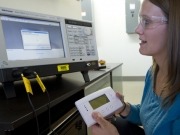
Current power generation causes 25.9% of global carbon emissions. However if the current inefficient grids are replaced with more efficient smart grids, then unnecessary CO2 emissions could be dramatically reduced claims the report.
Smart grids have been proven to reduce energy losses, and integrate renewable energy more effectively. Increasing the use of smart grids in our energy infrastructure, can therefore play a significant role in helping to reach carbon reduction targets. The IEA estimates that the deployment of a smart grid can result in a 0.9 to 2.2 gigatonne reduction in CO2 emissions by 2050.
Key Smart Grid Factors which will reduce CO2 emissions include introducing renewable energy capacities of 20% by 2020, replacing inefficient grids with smart grids that can reduce energy losses and the ability of smart grids to enable two-way communication between the customer and utility company thereby enabling optimal energy use and less wastage.
With a smart grid, energy usage can be relayed back to the utility company, in real time. This can help the utility companies to manage energy demands at peak times. Currently these energy peaks require high carbon dioxide polluting fossil fuels to meet demand. If the energy supply could be evened out and use energy stored previously, then less polluting fossil fuels will be needed and more renewable energy can be used. Renewable energy sources can then be balanced with the more stable sources of energy such as coal, gas, oil and nuclear. Increased use of renewable energy can then help reduce overall emissions.
Companies such as Landis+Gyr, Elster and Sensus are already investing in smart grid technology as are countries such as the US, Japan and China. These companies have formed important strategic agreements with other players in the smart grid network, most of which are involved in projects to reduce CO2 emissions.
Further information:

